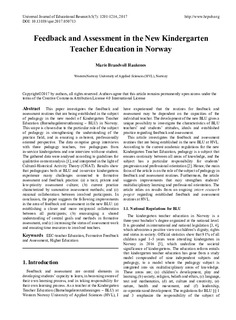Feedback and Assessment in the New Kindergarten Teacher Education in Norway
Original version
Haukenes MB. Feedback and Assessment in the New Kindergarten Teacher Education in Norway. Universal Journal of Educational Research. 2017;5(7):1201-1214 10.13189/ujer.2017.050713Abstract
This paper investigates the feedback and assessment routines that are being established in the subject of pedagogy in the new model of Kindergarten Teacher Education (Barnehagelærerutdanning – BLU) in Norway. This scope is chosen due to the particular role of the subject of pedagogy in strengthening the understanding of the practice field, and in ensuring a coherent, professionally oriented perspective. The data comprise group interviews with three pedagogy teachers, two pedagogues from in-service kindergartens and one interview with one student. The gathered data were analysed according to guidelines for qualitative content analysis [1], and interpreted in the light of Cultural-Historical Activity Theory (CHAT). Results show that pedagogues both at BLU and in-service kindergartens experience many challenges connected to formative assessment and feedback practice: (a) a tacit, private and low-priority assessment culture; (b) current practice characterized by summative assessment methods; and (c) minimal collaboration between involved participants. In conclusion, the paper suggests the following improvements in the area of feedback and assessment in the new BLU: (a) establishing a closer and more reciprocal collaboration between all participants; (b) encouraging a shared understanding of central goals and methods in formative assessment, and (c) increasing the status of assessment work and ensuring time resources to involved teachers.
Description
-

